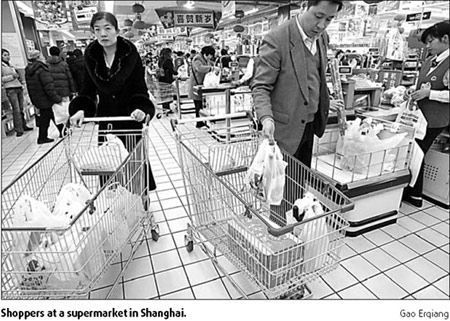 BEIJING, March. 13 -- Retail sales grew the most in 11 years to 20.2 percent in the January-February period year-on-year, on strong consumer spending and rising inflation. The reading, which matched the December figure, is 5.5 percentage points higher than the same period last year, indicating sustained strong growth due to the government's domestic-demand-centered economic policy, analysts said. "We believe strong retail sales growth is being driven by robust income growth," Song Yu and Liang Hong, of Goldman Sachs, said in a research note. "We expect the trend to continue going forward." The nation's CPI, the bellwether of inflation, surged to 8.7 percent in February, another main driver of retail sales growth. "But even if you strip out inflation, the growth is impressive," Lian Ping, chief economist at the Bank of Communications, said. Real-term retail sales growth in the January-February period was 12.6 percent year-on-year, compared with 13.8 percent in December, according to Goldman Sachs. "The small gap may be the result of the country's recent tightening measures to cool the economy, which has to some extent dampened consumer sentiment - in an indirect way," Sun Lijian, an economist at Fudan University, said. Tightened credit may, for example, result in less consumption of credit-backed goods and services. Real-term growth, however, has remained stable at around 13 percent in recent months, which shows that the country's recent policies to stimulate domestic consumption have begun to work, Lian said. The government has taken a series of measures in recent years to increase incomes, cut taxes and subsidize low-income earners to boost consumption. That saw consumption last year replace investment for the first time in contributing the most to GDP growth. "Compared with developed economies, we're still lagging behind in terms of the proportion of consumption behind economic growth. But we've had a good start," Lian said. The retail trend augurs well for China, which is battling to shift its economic focus from investment and foreign demand to domestic consumption, Lian said. The past year's high investment growth is one of the main culprits behind its white-hot 11.4 percent GDP growth, while relying on foreign demand has led to trade frictions and currency controversy. "In the coming years, fiscal support for a domestic demand-oriented strategy will continue to push up consumption, given our increasing economic prowess," Lian said. Last year, China registered fiscal revenue of 5.13 trillion yuan, up by about 32 percent year-on-year. (Source: China Daily)
BEIJING, March. 13 -- Retail sales grew the most in 11 years to 20.2 percent in the January-February period year-on-year, on strong consumer spending and rising inflation. The reading, which matched the December figure, is 5.5 percentage points higher than the same period last year, indicating sustained strong growth due to the government's domestic-demand-centered economic policy, analysts said. "We believe strong retail sales growth is being driven by robust income growth," Song Yu and Liang Hong, of Goldman Sachs, said in a research note. "We expect the trend to continue going forward." The nation's CPI, the bellwether of inflation, surged to 8.7 percent in February, another main driver of retail sales growth. "But even if you strip out inflation, the growth is impressive," Lian Ping, chief economist at the Bank of Communications, said. Real-term retail sales growth in the January-February period was 12.6 percent year-on-year, compared with 13.8 percent in December, according to Goldman Sachs. "The small gap may be the result of the country's recent tightening measures to cool the economy, which has to some extent dampened consumer sentiment - in an indirect way," Sun Lijian, an economist at Fudan University, said. Tightened credit may, for example, result in less consumption of credit-backed goods and services. Real-term growth, however, has remained stable at around 13 percent in recent months, which shows that the country's recent policies to stimulate domestic consumption have begun to work, Lian said. The government has taken a series of measures in recent years to increase incomes, cut taxes and subsidize low-income earners to boost consumption. That saw consumption last year replace investment for the first time in contributing the most to GDP growth. "Compared with developed economies, we're still lagging behind in terms of the proportion of consumption behind economic growth. But we've had a good start," Lian said. The retail trend augurs well for China, which is battling to shift its economic focus from investment and foreign demand to domestic consumption, Lian said. The past year's high investment growth is one of the main culprits behind its white-hot 11.4 percent GDP growth, while relying on foreign demand has led to trade frictions and currency controversy. "In the coming years, fiscal support for a domestic demand-oriented strategy will continue to push up consumption, given our increasing economic prowess," Lian said. Last year, China registered fiscal revenue of 5.13 trillion yuan, up by about 32 percent year-on-year. (Source: China Daily)